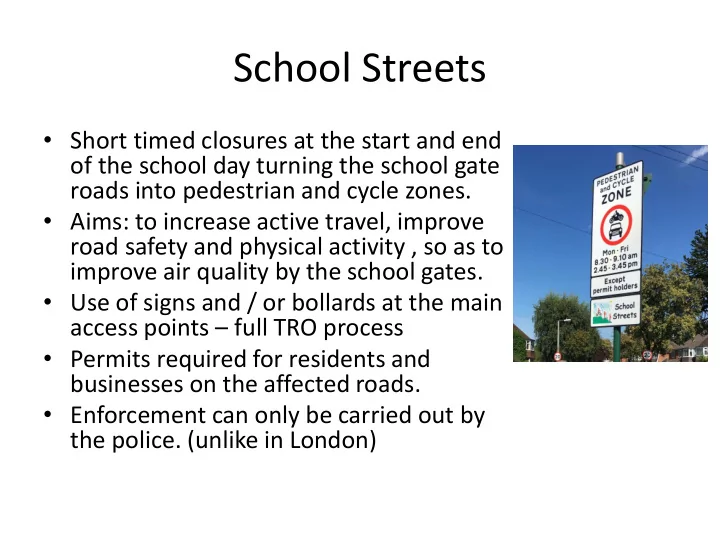

School Streets • Short timed closures at the start and end of the school day turning the school gate roads into pedestrian and cycle zones. • Aims: to increase active travel, improve road safety and physical activity , so as to improve air quality by the school gates. • Use of signs and / or bollards at the main access points – full TRO process • Permits required for residents and businesses on the affected roads. • Enforcement can only be carried out by the police. (unlike in London)
Examples of Physical Measures
Engagement, travel plans and feasibility • A range of approaches is essential to success. • Schools need to have implemented a travel plan with a range of the active travel and road safety initiatives to be suitable. A team of officers supports this work • Not all schools will be eligible for this scheme. • Schools on main roads will be advised to look at alternatives such as being a channel in any “No Idling” campaign. • A feasibility matrix and school assessment table has been developed to assess the suitability of schools, based on location and current progress of travel plan
Schools • A press release has gone out to all schools asking for an expression of interest. • Aim to have 6 schools that will be engaged in Sept for a ‘soft launch’ approach. With the aim to proceed with 2 in the first phase. • Example of a before and after:
Timescale • Over the summer holidays an internal group will be working on the legal framework, enforcement and permit issues. • An external group is proposed to have a citywide advisory role including campaign groups. • Aims: – By Sept 19 to have 6 pilot schools with 2 prioritised for piloting by implementation in phase 1. – By Feb 20 to have legal framework agreed and started on site in March 20 using Experimental Traffic Regulation Order. – 18 month process so once completed the first schemes could be made permanent by July 21.
No idling
Council resolution • Investigate, and implement if financially feasible – Zones to be introduced outside schools and parks – Enforcement to be done in partnership with Police/PCSOs – Extend zones to outside medical/care buildings – Investigate new policies/laws, including to increase the level of fine
Legal context • It is an offence everywhere • No prescribed DfT signage • Potentially confusing message • Criminal offence (so not enforceable by Parking attendants without a new bye-law). Can be done by 3GS • Enforcement requires someone to have been asked to turn off engine first • Likely not to be self-financing • Suggest occasional focus – This is the only DfT approved especially days of action sign, which needs specific permission to use it
Schools • There is an AQ problem Citywide, but… • Only a few schools in monitoring area breach legal limits (although we do want to do better!) • Ideally no-one should be stopped AT ALL outside on the zigzags. • Potentially weakens current school travel planning activity (by tacitly endorsing car use)
Behaviour change campaigns • Might better tackle the key problem – idling when queued in congestion • Invite people to be part of solution – better than fines? • Possible channels: – Could use VMS/Bus Backs/radio campaigns – Possibly banners outside key buildings – Maybe in key hotspots (Rail stations?) – Work with licensing? – Work with businesses and last mile delivery providers?
Recommend
More recommend